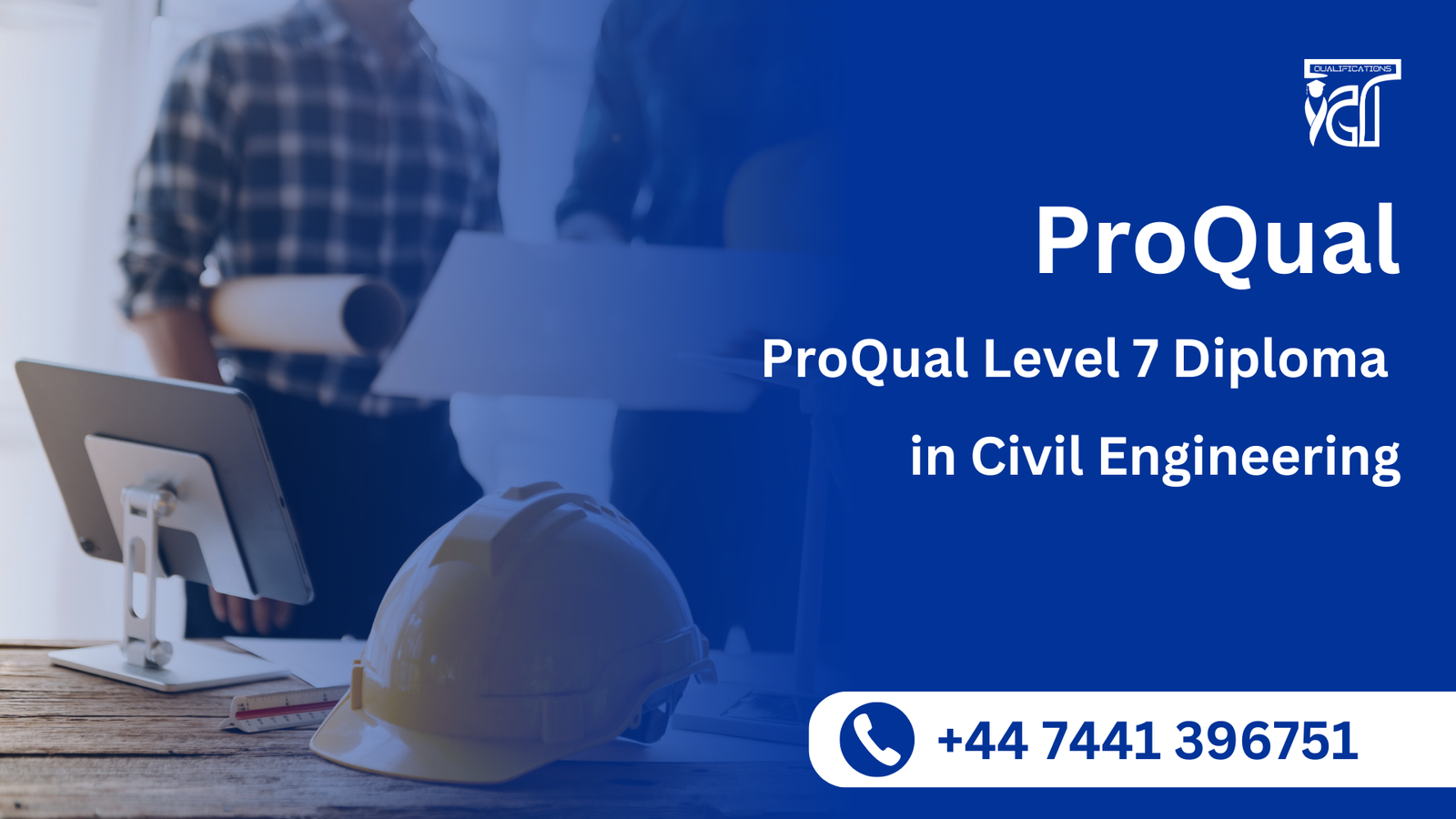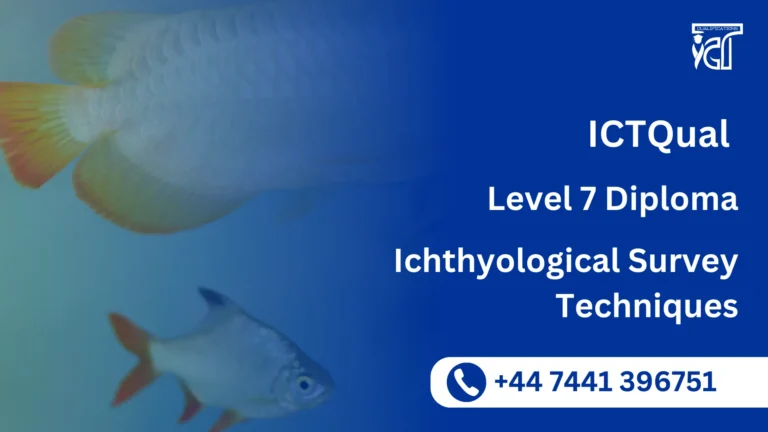The ProQual Level 7 Diploma in Civil Engineering is a distinguished Ofqual-regulated, Level 7 qualification, recognized as equivalent in rigor to a UK Master’s degree. This advanced diploma blends in-depth theoretical knowledge with real-world application ideal for professionals looking to lead complex civil engineering projects and solve mathematical challenges in structural design, surveying, cost estimation, and geotechnical analysis.
Designed for experienced civil engineers, project managers, and technical specialists, this diploma covers six mandatory units including Advanced Surveying Techniques, Structural Design & Analysis, Construction Project Management, and Estimation and Costing in Construction. Each module emphasizes high-level numerical reasoning, data interpretation, drafting precision, and quantitative analysis perfect for those seeking to enhance their MATH skills in a technical engineering context .
Whether you’re managing large-scale infrastructure development, leading sustainability-focused construction programs, or planning to register as a Chartered Engineer (CEng), this diploma equips you with the leadership, analytical, and project control skills needed to stand out. Its robust curriculum supports progression to senior roles like Civil Engineering Manager, Structural Consultant, or Project Director backed by global recognition and professional credibility.
ProQual Level 7 Diploma in Civil Engineering
The ProQual Level 7 Diploma in Civil Engineering, to achieve the qualification candidates must must complete the all mandatory units of Total Qualification Time (TQT): 1200 Hours, Guided Learning Hours (GLH): 600 Hours and 120 credits:
| Sr# | Unit Title | credit | GLH | TQT |
|---|---|---|---|---|
| 1 | Advanced Surveying Techniques | 20 | 100 | 200 |
| 2 | Estimation and Costing in Construction | 20 | 100 | 200 |
| 3 | Structural Design and Analysis | 20 | 100 | 200 |
| 4 | Construction Drawing and Drafting | 20 | 100 | 200 |
| 5 | Construction Project Management | 20 | 100 | 200 |
| 6 | Building Materials and Construction Technology | 20 | 100 | 200 |
GLH (Guided Learning Hours) and TQT (Total Qualification Time) are terms commonly used in vocational qualifications to help define the amount of time a learner is expected to spend on their studies.
1. GLH (Guided Learning Hours)
GLH refers to the number of hours a learner spends being directly taught, supervised, or supported during their course. This includes the time spent in activities such as:
- Classroom instruction
- Practical workshops
- One-on-one tutoring or mentoring sessions
- Online learning sessions with tutor support
In other words, GLH represents the time that learners are actively engaged with their instructors or learning activities.
2. TQT (Total Qualification Time)
TQT represents the total amount of time a learner is expected to invest in completing a qualification, including:
- GLH (Guided Learning Hours): Time spent on direct learning, as explained above.
- Self-Directed Learning: This includes time spent on independent study, research, assignment completion, preparation for exams, and any other work the learner does outside of direct teaching hours.
TQT is a broader measure that includes all the time required to achieve the qualification. It helps learners and employers understand the overall commitment required for the qualification.
Key Differences Between GLH and TQT:
- GLH focuses on direct learning with guidance or supervision.
- TQT includes GLH as well as independent study time and other learning-related activities.
Example:
If a qualification has a TQT of 600 hours and a GLH of 250 hours, it means the learner should spend 250 hours in direct learning (classroom, online, or tutor-led sessions) and 350 hours on independent study or research.
ProQual Level 7 Diploma in Civil Engineering
Advanced Surveying and Site Investigation
- Understand advanced surveying techniques used in civil engineering
- Evaluate site investigation methods for civil engineering projects
- Interpret and analyse data from site assessments
- Assess environmental factors during site investigation
Structural Design and Analysis
- Apply advanced structural design techniques to civil engineering projects
- Perform structural analysis for complex civil engineering structures
- Optimize structural design for safety and efficiency
- Evaluate the impact of environmental conditions on structural design
Estimation and Costing for Civil Engineering Projects
- Prepare accurate cost estimates for civil engineering projects
- Develop project budgets and financial plans for large-scale construction projects
- Evaluate cost implications of design and material choices
- Implement financial management strategies in construction project
Construction Project Management
- Apply advanced project management principles to civil engineering projects
- Allocate resources effectively in construction projects
- Manage risks in construction project execution
- Monitor and evaluate project performance
Construction Drawing, Drafting, and BIM
- Understand advanced drafting techniques in civil engineering
- Implement Building Information Modelling (BIM) in design and construction
- Coordinate multidisciplinary design through BIM integration
- Use BIM for construction scheduling and cost estimation
Sustainability and Environmental Impact in Construction
- Understand sustainable construction practices
- Conduct environmental impact assessments (EIA) for construction projects
- Implement green building technologies in civil engineering projects
- Promote energyefficient and lowcarbon construction solutions
Advanced Geotechnical Engineering
- Apply advanced principles of soil mechanics in civil engineering projects
- Design and analyse foundations for large infrastructure projects
- Implement ground improvement techniques for largescale infrastructure
Legal and Regulatory Framework for Construction
- Understand construction law and contract managemen
- Apply regulatory frameworks to ensure compliance in construction projects
- Understand the impact of legal issues on project delivery
Health, Safety, and Risk Management in Civil Engineering
- Apply health and safety best practices in civil engineering projects
- Conduct risk assessments in civil engineering projects
- Ensure legal and ethical compliance in health and safety practices
Advanced Materials and Construction Technologie
- Explore the latest materials used in civil engineering projects
- Analyse innovative construction technologie
Design and implement hi
Benefits of the ProQual Level 7 Diploma in Civil Engineering
The ProQual Level 7 Diploma in Civil Engineering is a prestigious qualification designed to help professionals advance in the civil engineering field. Whether you are an experienced engineer, a project manager, or a consultant, this diploma offers a range of benefits that can propel your career forward. Below are the key benefits of undertaking this qualification:
1. Ofqual Regulated Qualification
- The ProQual Level 7 Diploma in Civil Engineering is Ofqual-regulated, ensuring that it meets the highest academic and professional standards. This regulation guarantees that the qualification is recognized by employers, professional bodies, and educational institutions, making it a credible and respected certification in the global engineering industry.
2. International Recognition
- This diploma is globally recognized, providing you with the opportunity to work on civil engineering projects not only in the UK but also internationally. Whether you’re aiming for roles in the US, Europe, or the Middle East, the ProQual Level 7 Diploma opens doors to opportunities worldwide.
3. Flexible, Assignment-Based Learning
- The assignment-based structure of this qualification allows you to study at your own pace while applying your learning directly to real-world engineering problems. This flexibility is particularly beneficial for professionals who are already working in the field and need a course that fits around their busy schedules.
4. In-Depth Knowledge of Advanced Civil Engineering
- The course covers advanced topics in civil engineering such as structural analysis, geotechnical engineering, transportation engineering, water resources engineering, and sustainable engineering practices. By completing this diploma, you gain a deep understanding of cutting-edge engineering principles and practices.
5. Enhanced Career Opportunities
- The ProQual Level 7 Diploma equips you with the expertise needed to take on more senior and specialized roles within civil engineering. You can progress to positions such as project manager, engineering director, civil engineering consultant, and construction manager, all of which come with greater responsibilities and higher salaries.
6. Specialization in Modern Engineering Practices
- With a focus on sustainable design, green engineering, and advanced materials, this qualification ensures you stay ahead of industry trends. It helps you implement sustainable engineering practices in infrastructure projects, contributing to more environmentally friendly and cost-effective solutions.
7. Development of Leadership and Management Skills
- The course helps you develop key leadership and management skills, which are crucial for overseeing large-scale projects and leading teams of engineers. You will learn how to manage project budgets, schedules, risks, and resources, preparing you for senior leadership roles in the engineering sector.
8. Strong Industry Demand for Advanced Skills
- As the demand for qualified civil engineers with expertise in project management, sustainable design, and advanced structural engineering grows, this qualification positions you to meet that demand. Completing the ProQual Level 7 Diploma makes you more competitive in the job market and ensures your skill set aligns with industry needs.
9. Real-World Application of Knowledge
- The assignment-based structure of the course means that you will work on real-world scenarios and projects, allowing you to directly apply the concepts and skills you learn to your work. This practical approach ensures that you gain hands-on experience that can be immediately useful in your engineering practice.
10. Pathway to Chartered Status
- The ProQual Level 7 Diploma can serve as a stepping stone towards achieving chartered engineer status (CEng) through organizations like the Institute of Civil Engineers (ICE). This prestigious title further enhances your credibility and career prospects in the engineering industry.
11. Improved Earning Potential
- Completing the ProQual Level 7 Diploma positions you for higher-paying roles and career advancement. With the added expertise and qualifications, you’ll be well-placed to secure more lucrative job opportunities within the civil engineering sector.
12. Networking and Industry Connections
- Throughout the course, you will engage with a network of professionals and experts in the civil engineering field. This provides opportunities for collaboration, learning, and career connections that can be invaluable in your professional journey.
13. Preparation for Complex Engineering Challenges
- The course provides you with the knowledge and skills to tackle complex civil engineering problems. Whether it’s designing large infrastructure projects, managing construction teams, or ensuring sustainable practices, you will be well-equipped to handle the challenges of modern engineering projects.
The ProQual Level 7 Diploma in Civil Engineering is a specialized qualification ideal for professionals who wish to take their careers to the next level in civil engineering. This advanced course is specifically designed for those with prior experience in the field and aims to develop their technical, leadership, and management skills. Below are the key candidates who would benefit the most from this course:
1. Experienced Civil Engineers
- If you’re already working as a civil engineer and want to deepen your technical knowledge and expertise, this course is ideal for you. It provides the advanced skills required to handle more complex engineering projects and progress into leadership positions.
2. Project Managers in Civil Engineering
- For professionals managing engineering projects, this qualification will enhance your ability to oversee large-scale, high-budget projects. It equips you with the project management skills necessary to ensure successful project delivery, including risk management, scheduling, and resource allocation.
3. Senior Technicians or Supervisors
- If you’re currently in a senior technical or supervisory role, this diploma can help you advance into higher managerial positions. It provides you with the tools to transition from a technical expert to a strategic leader within your organization.
4. Construction Managers and Site Engineers
- Site engineers and construction managers who wish to take on more responsibility or move into a broader engineering management role will find this diploma valuable. The course provides the necessary knowledge of construction processes, project management, and the latest engineering practices.
5. Engineering Consultants
- If you work as an engineering consultant, the ProQual Level 7 Diploma in Civil Engineering helps you develop expertise in niche areas like structural analysis, sustainable design, and water resources engineering, enabling you to provide better-informed advice and solutions to clients.
6. Professionals Seeking Career Advancement
- For those who want to move into senior roles, such as engineering director, consulting engineer, or chief engineer, this diploma will equip you with the leadership, management, and technical skills necessary for these positions.
7. Aspiring Chartered Engineers
- If you’re aiming to achieve chartered engineer status (CEng) with organizations like the Institute of Civil Engineers (ICE), this qualification is an essential step. It provides the advanced academic background and practical knowledge required to progress in your engineering career.
8. Engineers Looking to Specialize
- If you’re interested in specializing in specific areas of civil engineering such as geotechnical engineering, sustainable construction, or transportation systems, this course offers the depth of knowledge you need to gain expertise in those areas.
9. Professionals in Other Engineering Disciplines Transitioning to Civil Engineering
- Individuals with a background in other engineering disciplines, such as mechanical or electrical engineering, who want to transition into civil engineering will benefit from the comprehensive coverage of core civil engineering topics provided by this diploma.
This Course May Not Be Ideal for:
- Entry-Level Engineers: If you’re just starting your career in civil engineering, this course might not be suitable, as it is designed for professionals with experience in the field.
- Non-Engineering Backgrounds: Individuals with no prior engineering education or experience may find the course challenging without a foundational understanding of engineering principles.
The ProQual Level 7 Diploma in Civil Engineering is more than a credential—it’s a strategic launchpad to senior-level careers, international recognition, and academic advancement. Designed for professionals aiming to lead in construction, infrastructure, and technical design, this Master’s-equivalent qualification paves the way for multiple high-impact opportunities.
1. Step Into Senior Civil Engineering Roles
Graduates of this diploma are equipped for leadership positions such as:
- Senior Civil Engineer
- Construction Project Director
- Infrastructure Consultant
- Structural Engineering Lead
- Technical Design Manager
These roles offer greater decision-making authority, project control, and increased earning potential.
2. Pathway to Chartered Engineer (CEng) Status
This Level 7 qualification helps fulfill academic requirements for Chartered Engineer (CEng) status with institutions such as the Engineering Council UK, ICE (Institution of Civil Engineers), or IET. Chartered status enhances professional credibility and global mobility.
3. Access to Postgraduate and Specialized Degree Programs
The diploma provides a strong foundation for pursuing:
- MSc or MEng in Civil, Structural, or Environmental Engineering
- MBA in Construction Project Management or Engineering Leadership
- Level 8 Diplomas or Doctoral (PhD) pathways in technical engineering or infrastructure planning
4. Launch a Career in Consultancy or Contracting
With a Level 7 diploma, you can transition into civil engineering consultancy, independent project supervision, or freelance infrastructure design working with clients across the public and private sectors.
5. Move into Government, Transport, and Urban Development Projects
This qualification enables professionals to take on roles in urban planning, highways, smart cities, rail systems, and sustainable development projects, where high-level design and policy integration are essential.
6. Expand Globally With UK-Recognized Certification
As an Ofqual-regulated qualification, this diploma is respected worldwide. It strengthens your CV for opportunities across the Middle East, Europe, Asia, and Africa, especially where UK-based engineering standards are in demand.
7. Broaden Your Specialization With Certifications in BIM, Quantity Surveying, or Project Controls
After completion, learners may pursue additional certifications in:
- Building Information Modelling (BIM)
- Cost Engineering & Quantity Surveying
- Project Controls & Planning
- Geotechnical or Water Resource Engineering
Entry Requirements
Register Now
Qualification Process
Qualification Process for theProQual Level 7 Diploma in Civil Engineering
- Self-Assessment:
Begin by evaluating your eligibility to ensure you meet the qualification requirements, including work experience, knowledge, and language proficiency. - Registration:
Complete your registration by submitting the required documents, including a scanned copy of a valid ID, and paying the registration fee. - Induction:
An assessor will conduct an induction to confirm your eligibility for the course and explain the evidence requirements. If you do not meet the criteria, your registration will be canceled, and the fee will be refunded. - Assignmnets & Evidence Submission:
Provide all assignmnets and the necessary evidence based on the assessment criteria outlined in the course. If you are unsure of the required evidence, consult with the assessor for guidance on the type and nature of evidence needed. - Feedback and Revision:
The assessor will review your submitted evidence and provide feedback. Evidence that meets the criteria will be marked as “Criteria Met,” while any gaps will be identified. You will be asked to revise and resubmit if needed. - Competence Evidence:
Submit final evidence demonstrating that all learning outcomes have been met. This evidence will be marked as “Criteria Met” by the assessor once it is satisfactory. - Internal Quality Assurance (IQA):
The Internal Quality Assurance Verifier (IQA) will review your evidence to ensure consistency, quality, and compliance with standards. - External Verification:
The IQA will submit your portfolio to ProQual’s External Quality Assurance Verifiers (EQA) for final confirmation. The EQA may contact you directly to verify the authenticity of your evidence. - Certification:
Upon successful completion of all checks, ProQual will issue your official certificate, confirming that you have attained the ProQual Level 7 Diploma in Civil Engineering.
FAQs for ProQual Level 7 Diploma in Civil Engineering







